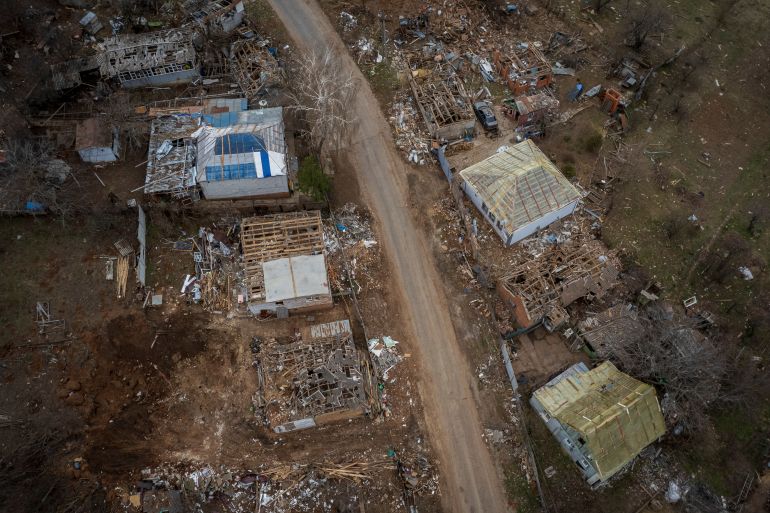Ukraine: From breadbasket to breadcrumbs
The war in Ukraine could lead to a global food crisis.

A mother in Somalia skips another meal so her children can eat. A father in Syria works for 13 hours but still cannot afford enough food for his family. A father in Niger sees his children go to sleep hungry.
Food prices, already rising from the pandemic, have skyrocketed because of the war in Ukraine; the World Bank estimating a shocking 37 percent rise. The price of wheat soared 80 percent between April 2020 and December 2021. In Syria, food prices have doubled in the last year.
Keep reading
list of 4 itemsUkrainians sigh with relief as US unlocks aid but say it won’t repel Russia
Qatar hails mediation ‘milestone’ as it hosts freed Ukrainian, Russian kids
US secretly sent long-range ATACMS weapons to Ukraine
The world was already rife with hunger before COVID-19 struck. In 2020, up to 811 million people – nearly one in 10 people – did not have enough food. And now the world is hurtling towards an unprecedented hunger crisis.
Many poorer countries are unable – and are too often made unable by an unequal global food system – to produce enough food to feed their people. They must rely on food imports. The reason is simple: crops are difficult to grow. The reasons for this are less simple: man-made climate breakdown is intensifying floods and droughts, locusts are ravaging crops, conflicts are destroying farmland and infrastructure, and people simply do not have enough money to buy seeds and equipment to grow crops.
Moreover, half of crops globally are now used to produce biofuels, animal feed and other products, like textiles. Many of these crops are monoculture, growing only one type of crop which destroys biodiversity and pulls nutrients from the soil. Not only is valuable farming land being used to grow crops not for food, but also the type of farming used damages the environment and results in fewer crops in the long term.
The reliance on food imports creates extreme vulnerability to external shocks. Nearly half of African countries import more than a third of their wheat from Russia and Ukraine. Fifteen countries, including Lebanon, Egypt and the Democratic Republic of the Congo, import more than half their share. Nearly all of Somalia’s wheat, where the worst drought in over 40 years has left millions facing famine-like conditions, comes from Russia and Ukraine.
And so rising and fluctuating food prices have hit vulnerable countries like a sledgehammer. Forty-two percent of Yemen’s wheat was shipped from Ukraine in the three months from December 20, 2021 to March 6, 2022, according to a shipping source consulted by Oxfam. A week after the war in Ukraine started, wheat prices in war-torn Yemen increased by 24 percent. The United Nations has said the country’s already dire hunger crisis is “teetering on the edge of outright catastrophe”. Lesson learned: dependency is dangerous.
Insanity is repeating the same mistakes and expecting different results. Advocates of large-scale, intensive industrial agriculture are saying, yet again, that we should ramp up global production. But this is not the solution. The world’s farmers produce enough food to feed the global population, and in recent years, the world has witnessed record harvests of grain production. The main problem is access to food, not availability. We need systemic change, not a short-term fix.
Governments tried to take short-cuts during the global 2007 – 2008 global food crisis which saw wheat and rice prices nearly double, pushing 100 million people into poverty, and by 2009 over one billion into hunger. The policy responses were either one-off, short-term initiatives or focused on the wrong target – increased production and investment in the private sector. These measures did nothing but plaster over the already existing cracks in the global food system, a system that is unsustainable for people and the planet.
We need to recognise that the underlying causes of hunger lie in extreme inequality. Immediately, governments must urgently bridge the gap between what people can afford and the price of the food they need. More funds are needed to deliver aid to people facing severe hunger across the world. Most importantly, donor governments should not raid aid budgets earmarked for crises in poor countries to pay for the new costs of Ukrainian support.
Denmark has already cut their funding to Mali, Syria and Bangladesh. Sweden has followed suit. No life is more valuable than another. Rich countries rightfully spent trillions of dollars to save their economies from the impact of the pandemic. A mere fraction of that is needed to make sure people around the world can put food on the table. But governments must go much further. That means investing in a sustainable future for all, in which small-scale family farming plays a key role.
Small-scale family farms feed one-third of the world’s population, and in Asia and sub-Saharan Africa they provide more than 70 percent of the food supply. If these farmers had more access to land, water, funding, infrastructure and markets, and their rights protected, they could produce much more food. They could drastically reduce poverty and hunger. That means, vitally, addressing the unequal climate crisis in which the poorest people and small-scale farmers who did the least to cause the crisis suffer the most at the expense of the over-consumption of the one percent. And it means addressing extreme land inequality – including guaranteeing women smallholder farmers land rights.
These are all things governments can – and should – urgently do. Hunger is unacceptable in the 21st century. To witness millions a step away from famine in a world of plenty, in a world where billionaire wealth has exploded, is an abomination. Only the right political choices can end hunger.
The views expressed in this article are the author’s own and do not necessarily reflect Al Jazeera’s editorial stance.
